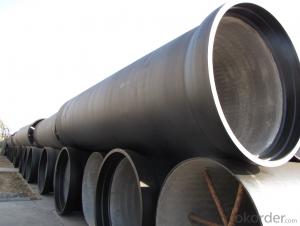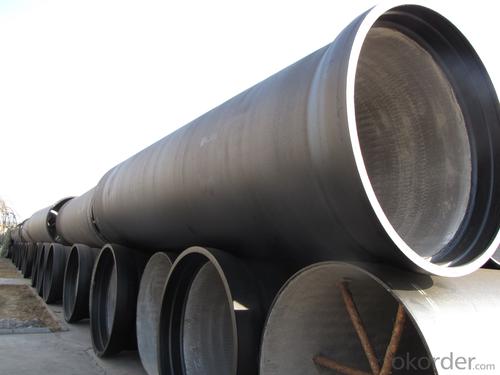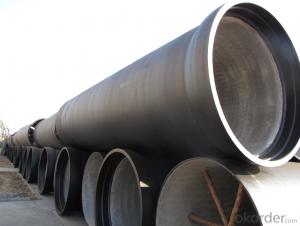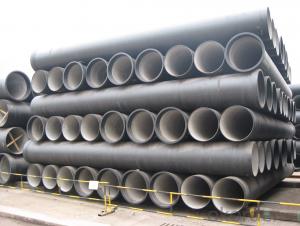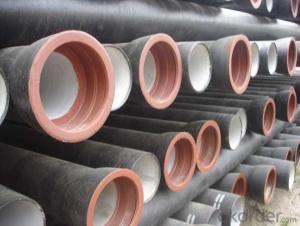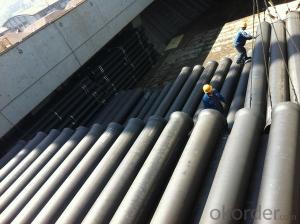EN545 Ductile Iron Pipe DN300 socket spigot pipe
- Loading Port:
- Tianjin
- Payment Terms:
- TT OR LC
- Min Order Qty:
- 200 m.t
- Supply Capability:
- 30000 m.t/month
OKorder Service Pledge
OKorder Financial Service
You Might Also Like
1) The standard of pipe: ISO2531:1998, EN545:2006,K9 K8
2) Effective length: 6m/5.7m
3) Inner cement line: Portland cement lineas per ISO4179
4) Zinc coating: at least 130g/m2 as per ISO8179
5) Bitumen painting: at least 70μm as per ISO8179
6)With 102% quantity of NBR, SBR, or EPDM ring asper ISO4633
7) DN80-DN1200
8) Highstrength, lighter than grey iron, good corrosion resistance, no furring, smallflow resistance, easy fixing, long life tome about 100 yeas
9)Checked by automatic inspection equipment
10) Composition:
Chemical composition | |||
Chemical composition | Ductile Cast Iron Pipe (%) | Grey iron pipe (%) | Steel pipe (%) |
C | 3.5-4.0 | 3.2-3.8 | 0.1-0.2 |
Si | 1.9-2.6 | 1.4-2.2 | 0.15-0.4 |
Mn | 0.15-0.45 | 0.4-0.6 | 0.3-0.6 |
P | ≤0.06 | ≤0.3 | 0.02-0.03 |
S | ≤0.02 | ≤0.1 | 0.02-0.03 |
Mg | 0.03-0.06 |
|
|
11) Feature:
Mechanical properties | |||
| Ductile Cast Iron Pipe | Grey Iron Pipe | Steel Pipe |
Tensile Strength(Mpa) | ≥420 | 150-260 | ≥400 |
Yield Strength(Mpa) | ≥300 | No Confirmation | No Confirmation |
Bending Strength(Mpa) | ≥590 | 200-360 | ≥400 |
Elongation (%) | ≥10 | Neglected | ≥18 |
Brinell Hardness(HBS) | ≤230 | ≤230 | About 140 |
12) T type mechanical joint
13) Packing: in bulk or container
PACKING: 1) Pipesare bundled together with the steel belt.
2) Wooden pieces are put between the pipes.
- Q: Can ductile iron pipe be used for sewer and wastewater systems?
- Yes, ductile iron pipe can be used for sewer and wastewater systems. Ductile iron is a type of cast iron that has improved properties such as increased durability, strength, and flexibility. These qualities make it suitable for underground applications, including sewer and wastewater systems. Ductile iron pipes are resistant to corrosion and can withstand high-pressure conditions, making them ideal for conveying sewage and wastewater. Additionally, ductile iron pipes have a long service life and require minimal maintenance, which makes them a cost-effective choice for sewer and wastewater infrastructure.
- Q: Does the cast iron pipe for spheroidal graphite need corrosion protection when laying underground?
- In quality, the spheroidization of cast iron pipes is controlled to be 1-3 (spheroidization rate 80%), so the mechanical properties of the cast iron pipes, ductile iron pipes and finished product libraries can be better improved, with the nature of iron and the properties of steel
- Q: Can ductile iron pipes be recycled?
- Yes, ductile iron pipes can be recycled. Ductile iron is a type of cast iron that has superior strength and durability, making it a popular choice for various applications, including water and sewage pipelines. When these pipes reach the end of their useful life, they can be recycled and used to manufacture new products. The recycling process involves melting down the ductile iron pipes to extract the iron, which can then be used as a raw material for producing new ductile iron products. Recycling ductile iron pipes not only helps conserve natural resources but also reduces the environmental impact associated with mining and manufacturing new materials.
- Q: How is ductile iron pipe tested for quality?
- Ductile iron pipe is extensively tested for quality to ensure its performance and reliability in various applications. The testing process involves several steps to assess the physical and mechanical properties of the pipe. One of the primary tests conducted on ductile iron pipe is the hydrostatic pressure test. This test involves subjecting the pipe to fluid pressure higher than its designed operating pressure to determine its ability to withstand internal pressure without leakage or failure. The pipe is filled with water or another suitable fluid, and pressure is gradually increased to the required level. The pipe is inspected for any signs of leakage or deformation during this test. Another crucial test is the tensile strength test, which measures the pipe's ability to resist pulling or stretching forces. A sample of the pipe is pulled until it breaks, and the maximum force applied during the test is recorded. This test helps determine the pipe's ultimate tensile strength, yield strength, and elongation properties. Ductile iron pipe is also tested for its impact resistance through the Charpy test. This test involves striking a notched sample with a swinging pendulum to measure the amount of energy absorbed by the pipe. It helps assess the pipe's ability to withstand sudden impacts or loads without fracturing. Additionally, the pipe undergoes various non-destructive tests, including ultrasonic testing, magnetic particle inspection, and visual inspection. These tests help detect any internal or external defects, cracks, or abnormalities that may affect the pipe's structural integrity. Furthermore, chemical analysis and metallographic examination are performed to evaluate the chemical composition and microstructure of the ductile iron pipe. These tests ensure that the pipe meets the required specifications and standards for its intended application. Overall, the testing process for ductile iron pipe is comprehensive and rigorous, aiming to guarantee its quality, durability, and overall performance in delivering water, wastewater, or other fluids safely and efficiently.
- Q: Can ductile iron pipe be used for industrial applications?
- Yes, ductile iron pipe can be used for industrial applications. Ductile iron pipes are known for their durability, strength, and resistance to corrosion, making them suitable for various industrial settings. They can handle high-pressure and heavy-duty applications, making them ideal for industries such as water and wastewater, oil and gas, and chemical processing.
- Q: Are ductile iron pipes suitable for underground river crossings?
- Yes, ductile iron pipes are suitable for underground river crossings due to their high strength, durability, and resistance to corrosion. They can withstand the pressure of flowing water and provide long-term reliability in such challenging environments.
- Q: Are ductile iron pipes suitable for use in hydropower projects?
- Yes, ductile iron pipes are suitable for use in hydropower projects. Ductile iron pipes have a high tensile strength and are resistant to corrosion, making them ideal for applications in hydropower projects where water flow and pressure are involved. They are capable of withstanding high pressure and are durable, ensuring long-term reliability and safety in hydropower systems. Additionally, ductile iron pipes are cost-effective compared to other materials like steel, making them a popular choice for hydropower projects. Overall, ductile iron pipes offer the necessary characteristics and performance qualities required for the demanding conditions of hydropower projects.
- Q: How does ductile iron pipe perform in areas with high soil corrosivity?
- Ductile iron pipe performs well in areas with high soil corrosivity due to its inherent corrosion resistance. The unique composition of ductile iron, with its graphite nodules providing internal protection, makes it highly resistant to corrosion from soil and external factors. This allows the pipe to maintain its structural integrity and longevity in corrosive environments, making it a reliable choice for such areas.
- Q: Can ductile iron pipes be used for underground chemical processing systems?
- Ductile iron pipes are generally not recommended for use in underground chemical processing systems due to their limited resistance to corrosion from various chemicals. While ductile iron pipes are known for their strength, durability, and flexibility, they are still vulnerable to corrosion when exposed to certain chemicals, especially those with high acidity or alkalinity. In underground chemical processing systems, there is a higher risk of exposure to corrosive substances that can deteriorate the ductile iron pipes over time. This can lead to leaks, cracks, and failures in the piping system, compromising its integrity and potentially causing hazardous conditions. For underground chemical processing systems, it is advisable to consider alternative materials that are more resistant to corrosion, such as stainless steel, PVC, or high-density polyethylene (HDPE) pipes. These materials offer superior chemical resistance and can withstand the harsh conditions typically present in chemical processing environments. It is crucial to consult with experts in chemical engineering, piping design, and corrosion resistance to determine the most suitable materials for underground chemical processing systems. Proper material selection is vital to ensure the longevity and safety of the piping infrastructure in such environments.
- Q: Can ductile iron pipes be used for wastewater reuse projects?
- Yes, ductile iron pipes can be used for wastewater reuse projects. Ductile iron is a strong and durable material that can withstand the corrosive nature of wastewater. It is commonly used in wastewater treatment plants and distribution systems for its ability to handle high-pressure and heavy loads. Additionally, ductile iron pipes have a long lifespan, making them a reliable choice for wastewater reuse projects.
Send your message to us
EN545 Ductile Iron Pipe DN300 socket spigot pipe
- Loading Port:
- Tianjin
- Payment Terms:
- TT OR LC
- Min Order Qty:
- 200 m.t
- Supply Capability:
- 30000 m.t/month
OKorder Service Pledge
OKorder Financial Service
Similar products
Hot products
Hot Searches
Related keywords
